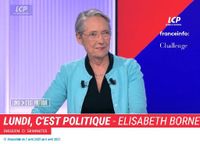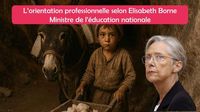In a recent statement that has ignited a firestorm of debate, French Minister of Education Élisabeth Borne suggested that professional orientation for children should begin as early as kindergarten. This provocative assertion has been met with a mix of humor, skepticism, and criticism from various corners of the internet and political landscape.
During a discussion on April 7, 2025, on the LCP platform, Borne stated, "Il faut se préparer très jeune, dès le départ, presque depuis la maternelle, à réfléchir à la façon dont on se projette dans une formation et dans un métier demain." ("We need to prepare very young, from the start, almost from kindergarten, to think about how we project ourselves into training and a job tomorrow.") This comment raised eyebrows, prompting immediate reactions on social media, where users expressed their disbelief and amusement.
Just a day later, on April 8, Borne attempted to clarify her remarks, asserting, "Non ! On ne va pas orienter les élèves dès la maternelle !" ("No! We are not going to orient students from kindergarten!"). She emphasized the importance of not conditioning students' choices based on gender or other factors and instead focusing on helping them discover their capabilities and develop self-confidence.
Despite this clarification, the initial remarks sparked a wave of memes and jokes online. Users took to platforms like Twitter to share their thoughts on the absurdity of expecting kindergarteners to make career decisions. One user humorously suggested that children should be ready to choose their future professions while playing with toys, saying, "À 3 ans quand tu joues à pat patrouille t’es censé savoir que tu veux faire banquier plus tard" ("At 3 years old, when you're playing Paw Patrol, you should know you want to be a banker later").
Critics of Borne's comments have pointed out the disconnect between the realities faced by many families and the expectations set by political leaders. French professor Ophélie Roque noted the absurdity of asking children to consider their futures at such a young age, questioning whether politicians truly understand the challenges faced by ordinary citizens.
In a broader context, Borne's comments come amid significant concerns regarding the performance of French students in education. The PISA 2022 survey revealed a marked decline in students' abilities, particularly in mathematics, where scores dropped by 21 points compared to 2018, marking the lowest level since 2000. The percentage of high-achieving students fell from 13% to 7% over the past decade, while the number of students struggling with basic skills increased. This trend highlights urgent challenges within the French educational system, exacerbated by the COVID-19 pandemic.
As Borne's statements continue to reverberate through public discourse, they raise important questions about the role of education and the expectations placed on young children. Many argue that instead of pushing for early career orientation, the focus should be on fostering a supportive learning environment that prioritizes emotional security, socialization, and language development.
Furthermore, the ongoing debate over educational reform has drawn attention to the disparities between the experiences of elite students and those in the public education system. Critics argue that many politicians, including Borne, have insulated their children from the realities faced by the average student, as they often attend prestigious private schools. This separation raises concerns about the authenticity of their proposals and the potential impact on public policy.
As the dialogue surrounding Borne's remarks unfolds, it remains clear that the issue of educational orientation is deeply intertwined with broader societal values and expectations. The push for early career guidance reflects a utilitarian approach to education that may not align with the developmental needs of young children.
Ultimately, the conversation surrounding Borne's comments serves as a reminder of the complexities involved in shaping educational policy. As society grapples with the challenges of ensuring equitable access to quality education, the focus may need to shift toward nurturing the holistic development of children rather than pressuring them into predetermined career paths at an age when they are still discovering their identities.
In conclusion, while Borne's intentions may stem from a desire to improve the educational landscape, the implications of her statements have sparked a necessary debate about the values we hold regarding childhood, education, and the future of our society.





